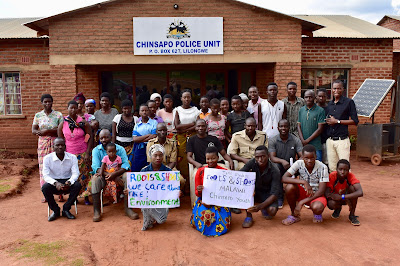GET TO KNOW THE MAN BEHIND "ALL CREATURES"
Learn more about Dr Richard Ssuna the Director and CEO of ALL CREATURES, know what inspires him and his thoughts about animal welfare in Malawi
1. Who is Dr. Ssuna and what role does he play with regards animal welfare in Malawi?
I’m Kenyan born, Ugandan raised and both Ugandan and British trained veterinarian with a strong desire for promoting animal welfare in Africa. I initially came to for a three months’ consultancy with Born Free Foundation to start the veterinary programme at the Lilongwe Wildlife Centre, that had so many animals but without any veterinary capacity at the time. My stay was extended for two years under joint tenure with the Royal Society for the Prevention of Cruelty to Animals and Born Free Foundation.
It is at this time way back
in 2009 that I started the animal welfare campaign with the Lilongwe Society
for the Protection and Care of Animals. Some of my works included the
sensitization of the Malawi Police, Judiciary and the entire public on the
Animal Protection Act, the ending of controlling the dog population through
shooting in Lilongwe, the introduction of free rabies campaign in the City,
Introduction of Humane Education in schools and many other programmes, not
limited to starting the first animal welfare charity in Malawi. It is from this
perspective that I also became the first World Animal Day Ambassador for Malawi
as well as driving the animal welfare agenda at both a national and a
continental scale. Besides contributing towards the animal welfare component of
the Malawi National Livestock Policy, I have been involved in studying the illegal
and cruel trade on donkey skins in Africa with the Donkey Sanctuary UK as well
as contributing to the draft Africa Animal Welfare Strategy.
2. What inspired you to work in this area?
I cannot recall my earliest experience with animals but what I know is that my maternal grandfather (RIP) with whom I spent most of my toddler years was a cattle keeper, kept dogs and bought me the first pet that was a kitten. My love and interaction with this cat was what erroneously informed the villagers that my familial asthmatic attacks were transmitted by this cat. I now know that this cat contributed to some of my near death status asthamticus episodes but also aware that it is a genetic allergic disorder taken down from my paternal grandfather. So these are some of the earliest encounters with animals but I have many others that I remember more vividly but would might exhaust the provided space with my childhood animal stories.
3. What is the state of Animal Welfare in Malawi?
Animal Welfare is in her formative stages in Malawi. There is however steady progress from many different fronts. Whilst there is still a lot to do to make animal welfare a basic value in our society, I think we are well on the right path to creating a good future for the animals of this country.
4. Against a backdrop of social problems e.g. poverty, poor education, poor health care, etc.
why should the average Malawian pay attention to the welfare of animals?
Animal welfare is not an expense but rather a duty that we all have towards our animals. There is a misconception that good animal welfare is what the rich do by driving their pets in cars to the vet or the park for a walk, instead we all have a duty to provide for our animals and basic things like taking your dog to the dip every week, ensuring that you see a vet when they provide free vet services like rabies or spay and neuter clinics etc would make such a big difference to that animal. The rearing of indigenous free ranging chickens, on the contrary is much cheaper than the deep litter broiler or layer farming. Whilst animal welfare could prove costly in the western world, Africa is still endowed with the possibility of providing optimum care with minimal associated costs.
5. What makes animal welfare a human responsibility?
The majority of human-animal interaction is from a utilization basis. We seek companionship, food, dressing, cultural needs, security (both financial and physical), status, sacrifice and many others. It is there imperative morally that we should ensure that we protect and provide for them. The animals dependence on humans is akin to that of a child to an adult and that is what leads to regulation of animal utilization legally. Even though animal ownership as an asset is a human right, they are vulnerable to abuse under this tag they bear as assets and that is the reason Malawi has an Animal Protection Act.
6. What are you hopes and dreams for animal welfare in Malawi?
Very Bright due the government goodwill, donor confidence and quick adoption by the people.
7. Is there anything else you enjoy doing apart from animal welfare?
I love conceptualizing and laying strategy. This makes me more like a behind the scenes kind of person while allowing other people enjoy the glory if the objective is met.





Comments
Post a Comment